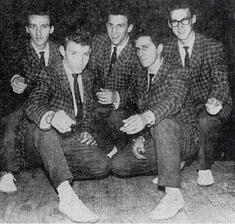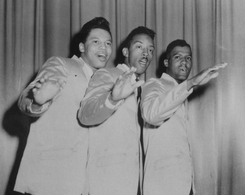-
Par dion1 le 4 January 2010 à 02:07

The Four Lovers (New-York)
Personnel :
Frankie Valli (Lead)
Hank Majewski (Bass)
Tommy DeVito (Tenor)
Nicky DeVito (Tenor)
Discography :
The Four Lovers
1956 - You're the Apple of My Eye / The Girl in My Dreams (RCA 6518)
1956 - Honey Love / Please Don't Leave Me (RCA 6519)
1956 - Jambalaya (On the Bayou) / Be Lovey Dovey (RCA 6646)
1957 - Never Never / Happy Am I (RCA 6768)
1957 - Shake a Hand / The Stranger (RCA 6812)
1957 - The Stranger / Night Train (RCA 6819)
1957 - My Life for You / Pucker Up (Epic 9255)
1957 - I Want a Girl (Just Like the Girl That Married Dear Old Dad) (RCA LP 1317)
1957 - Such a Night (RCA LP 1317)
1957 - (I Love You) For Sentimental Reasons(RCA LP 1317)
1957 - Joyride (RCA LP 1317)
1957 - This Is My Story (RCA LP 1317)
1957 - Memories of You (RCA LP 1317)
1957 - It's Too Soon to Know (RCA LP 1317)
1957 - San Antonio Rose (RCA LP 1317)
1957 - White Christmas (RCA LP 1317)
1957 - Cimarron (RCA LP 1317)
1957 - Lawdy Miss Clawdy (RCA LP 1317)
1959 - It May be Wrong / Please take a chance (Decca 30994)Frankie Valle & The Romans (2)
1959 - Come Si Bella / Real (This Is Real) (Cindy 3012)Biography :
The Four Seasons are justifiably among the most fondly remembered pop/rock vocal groups of the early to mid-'60s. Their soaring harmonies, coupled with Frankie Valli's exquisite falsetto lead on romantic, teenage-oriented songs, were as central to the early-'60s music scene as the work of the Beach Boys, Del Shannon, or any other top rock & roll names one cares to invoke from that period. But before Valli and company emerged with their first hit in the summer of 1962, they spent eight years working in music, first as the Variatones and, more permanently, as the Four Lovers. They never charted a record higher than number 62 (their only chart entry), but did record more than two dozen songs, including a complete LP for a major label. And their music roots were closer to Frank Sinatra than to Elvis Presley.

The Four Lovers started out in the early '50s, but the individual members' musical backgrounds went back to the 1930s. Their whole story started with the DeVito family of Belleville, a working-class town in northern New Jersey just outside of Newark, part of the same locale that produced Frank Sinatra, Connie Francis, and Lou Costello, among other performing legends during the 1930s. The whole family was musical and, beginning with eldest son Danny, took up singing and an instrument from their father. Tommy DeVito (born June 19, 1928) emerged in music at the age of ten, appearing on Major Bowes' Original Amateur Hour.
Two years later, he was singing and playing guitar with Nickie & the Starliters, an octet modeled after the professional pop (or "sweet," as they were called) bands of the era, led by his older brother Nickie DeVito (born September 12, 1924), who also played bass. They made a decent part-time living, picking up extra cash playing dances, weddings, and parties until World War II and the draft broke up their membership. After World War II, the two DeVito brothers tried keeping their hands in music and hooked up with Nick Macioci (born September 19, 1927, and better-known in later years as Nick Massi) to form what became the Variety Trio. They played local clubs, all of them singing, with Tommy and Nickie DeVito on lead and rhythm guitar, respectively, and Massi playing the upright bass. After a couple of years of successful local gigs, they added a fourth, part-time member who began showing up at their performances, Frank Castelluccio (born May 3, 1934, and later known as Frankie Valli). He was 16, had a distinctive voice, and a repertory of two songs, "I Can't Give You Anything but Love" and "My Mother's Eyes."

The sight of the slightly built teenager with the falsetto voice doing those pre-war songs was a novelty in itself, and they went over well with the group's audience. The trio split up in 1952, and for a time during the next couple of years, Castelluccio and Tommy DeVito worked together in various backing bands and recorded a pair of songs together under the auspices of Corona Records in New York. They formed a new group, the Variatones, with Hank Majewski on rhythm guitar and Billy Thompson on drums, while "Frankie Valley," as he was calling himself by then, handled the bass. In early 1956, they got an audition for RCA Victor, where they impressed the executives present with their harmony singing and their mixed repertory of country music and R&B.
This wasn't an uncommon mix at the time, nor was it unheard of for white vocal groups who were the least bit adventurous. A few white outfits, such as the Crew-Cuts, became notorious in purist circles for making more commercially successful covers of R&B singles by black groups, but many did take up the music with only the most honest and honorable intentions -- because they liked it -- and one outfit from Texas, the Mints, was regarded at the time as a serious white equivalent to the Treniers. The Variatones liked the music and had the talent and years of experience, together and collectively.


The group got a contract and a new name, the Four Lovers, and began a year-long stay with the record label. Thompson was soon gone from the lineup, with Valley moved over to drums and Nickie DeVito back in the fold on bass. They made their recording debut with a decided R&B emphasis, including a pair of Otis Blackwell songs, "You're the Apple of My Eye" and "Diddilly Diddilly Babe," "Honey Love" from the Drifters, a cover of Faye Adams' "Shake a Hand," and "Please Don't Leave Me," written by Fats Domino.
There were rocking sides there, though not even necessarily the kind of harmony based music that could be described as doo wop. Their version of "Shake a Hand" was as much a showcase for Tommy DeVito's hot guitar playing as it was for the group's backup singing, and the lead vocal is closer to Elvis Presley than to the falsetto singing that Valli would succeed with fronting the group six years later. Blackwell's "You're the Apple of My Eye," which had such a mannered and exaggerated performance that it almost sounded like a parody of R&B harmony material, ended up as the Four Lovers' one and only chart entry, peaking at number 62. The group kept trying and RCA kept trying with them, releasing another single and then an entire LP, entitled Joyride.


The latter is interesting to hear, both as a cultural artifact for the variety of vocal material (which includes a rocked up version of Irving Berlin's "White Christmas" and a cover of Lloyd Price's "Lawdy Miss Clawdy," and also pop numbers, a concession to the fact that early rock & roll listeners didn't buy many LPs) and as a document of the group's range, stuck in among the vocal numbers is the title track, an instrumental which was a surprise coming from a group known for its singing. By that time, rock & roll was sweeping the charts and the group's act was appropriately oriented toward harmony versions of R&B material. It wasn't enough to sell them to the public and in early 1957, they were dropped by RCA Victor.

The group stayed together, continuing to cut songs for Epic and OKeh, and by 1958, their lineup had changed with Nickie DeVito and Hank Majewski leaving to be replaced by Nick Massi and Hugh Garrity, both of whom drifted in and out of the group. In late 1959, they added Bob Gaudio, an ex-member of the Royal Teens who was a natural songwriter. That same year, they made their first contact with Bob Crewe, a producer who was always looking for local talent in the New Jersey/Pennsylvania area that he might record.

The Four Lovers came to an end as a name but not a group during the next few years. They did a lot of backup singing on behalf of other artists in sessions run by Crewe, and occasionally cut records of their own for local labels under various names until they finally settled on the Four Seasons in 1961. Their lineup, by then, was Frankie Valli, Bob Gaudio, Tommy DeVito, and Nick Massi. The group wasn't working nearly full-time or making much money, however, and by 1962, Valli was making his living in construction. It was in the spring of that year that Bob Gaudio came up with a song called "Sherry," that he insisted by given to Valli and their group to cut. Crewe agreed and released by the Vee-Jay label, it hit number one nationally barely a month after release, thus beginning a new, more visible and successful phase in the history of the Four Seasons.
Bruce Eder, All Music Guide
Videos :
You`re The Apple Of My Eyes
Baby Please Don`t Go
Songs :
The Girl In My Dreams Memories of you
Honey Love JambalayaCD:
 your comment
your comment Follow this section's article RSS flux
Follow this section's article RSS flux Follow this section's comments RSS flux
Follow this section's comments RSS flux
Doo Wop - Rhythm & Blues - Mail : jcpiazza26@gmail.com




